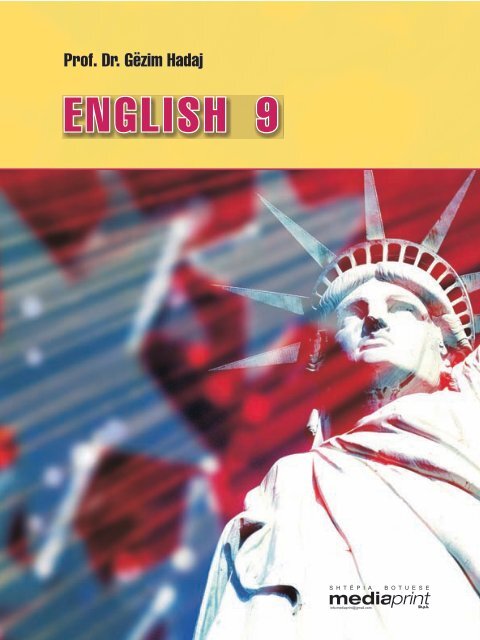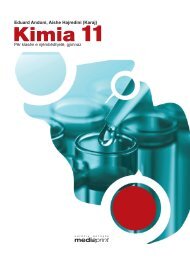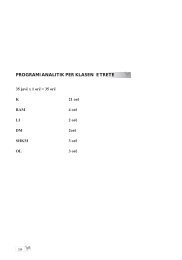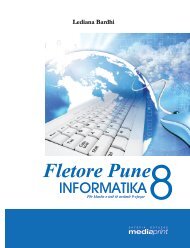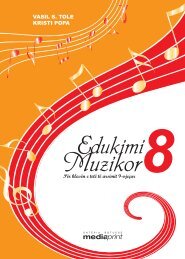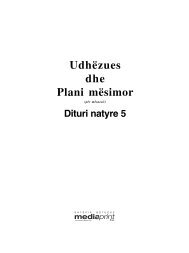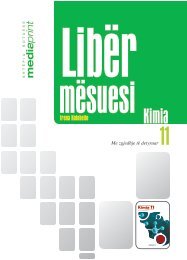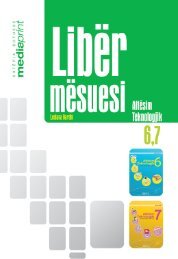anglisht 9 - Media Print
anglisht 9 - Media Print
anglisht 9 - Media Print
- No tags were found...
You also want an ePaper? Increase the reach of your titles
YUMPU automatically turns print PDFs into web optimized ePapers that Google loves.
Prof. Dr. Gëzim HadajENGLISH 9S H T Ë P I AB O T U E S Einfo.mediaprint@gmail.com
English 9
ContensRevision I What People Use English For? .............................................. 4Unit 1 Niagara Falls ................................................................. 10GenderUnit 2 Devil’s Tower ................................................................... 15The past continuous and past simpleUnit 3 Donald Trump Interview ..................................................... 20Imperative doUnit 4 We can do without TV...................................................... 26The present perfect and present perfect continuousUnit 5 Teenagers...................................................................... 31Emphatic doRevision II Sworn virgins .................................................................. 36Unit 6 The V-Sign ...................................................................... 40The passiveUnit 7 Benjamin Franklin ............................................................ 45Past continuous passiveUnit 8 “I have a Dream” by Martin Luther King, Jr. .......................... 50Predictions: willUnit 9 Melting Pots and Mosaics ................................................. 55Will, would, shall and shouldUnit 10 Traditional vs modern ...................................................... 60Must / Have to...Revision III John Belushi: Getting Married............................................ 65Unit 11 Narcissus ...................................................................... 69Reflexive pronounsUnit 12 Europe’s Day .................................................................. 74Phrasal verbsUnit 13 Galileo and the Tower of Pisa ........................................... 79Conditional sentencesUnit 14 The Robin. Weather forecaster.......................................... 84Conditional ifUnit 15 Marin Barleti.................................................................. 89The by-phraseRevision IV Education and Schools ................................................... 943
What People UseEnglish For?English is the main language of books, newspapers, airports and air-traffic control,international business and academic conferences, science, technology, diplomacy,sport, international competitions, pop music and advertising.Over two-thirds of the world’s scientists read in English. Three quarters of theworld’s mail is written in English. Eighty per cent of the world’s electronically storedinformation is in English. Of the estimated forty million users of the Internet, someeighty per cent communicate in English, but this is expected to decrease to forty percent as speakers of other languages get online.Around 750 million people are believed to speak English as a foreign language.One out of four of the world’s population speak English to some level of competence.Demand from the other three- quarters is increasing.I. Questions:1. What do you use English for?2. Can you give some figures about the use of English in different fields?3. How many people are believed to speak English as a foreign language?44
II Phonetics:Don’t give up: Practice makes perfect!When the English tongue we speakWhy is break not rhymed with weak?Won’t you tell me why it’s trueWe say sew, but also few?And the maker of a verseCannot rhyme his horse with worse?Beard is not the same as heard,Cord is different from word.Is there any reason known?To sum it up, it seems to meThat sounds and letters don’t agree.III Divide into groups of five andact the dialogue:(The debate in English is more important thanthe actual lesson. A lot of English classes,therefore, are built on opinions, not objectivefacts like math and science lessons. Thefollowing students debate about the topic:“Why do we need English?”)IV Introducing the English-speaking world.1 Name the English-speaking countries.1 st student: What’s this? What’s this country?2 nd student: It’s…/ This is a…1 st student: Where is …………….?2 nd student: Here/I don’t know.2 Learn the names and locations of thedifferent countries, you can use thefollowing documents about English-speaking countries.What’s this? It’s the Statue of Liberty etc1 st student: English is an easy language. Thereare no accents, the tenses of verbs aresimplified and the adjectives are invariable.2 nd student: After three years studying Englishat school. I agree with him but I find themany different ways words are pronouncedand the spelling difficult to cope with.Sidney Opera HouseThe Statue of Liberty3 rd student: I find English interesting and coolbecause through it I can understand manyfilms and songs.4 th student: We need English to travel aroundthe world - it’s a language almost everybodyunderstands - so it’s easier to communicatewith people from different cultures.5 th student: You must speak English if you wanta good job especially if you want to workwith computers.the ShuttleBig BenRevision I5
Revision IDo you know any of the countries whereEnglish is spoken? Name the main countries.You can say: English is spoken in a lot ofcountries: in Great Britain, the United States,Australia, Canada, South Africa etc. Nowpoint to the countries at the same time andthen say: Look, listen and try to remember thenames of the countries where English is spoken.Look! This is Australia etc..3 Then you can point to a country y and say:What country y is this? Or What’s s thiscountry?y? If nobody answers, say: This is…or It’s…s…4 Practice the following language patterns:- 1 st student:Where is Canada?Where is Great Britain?Where is South Africa?Where is New Zealand (the United States)?- 2 nd student: Here/I don’t know.V CrosswordsCountries and nationalitiesFill in the following crossword. Eachanswer is a country or a nationality.Down1. He is British. He comes from _________.2. She is Italian. She lives in _________.663. He comes from Sweden. He is ________.4. They are Dutch. They come from _____.5. He was born in China. He is _________.6. We come from Greece. We are________.7. He is German. He was born in ________.8. She is Danish. She comes from ________.9. Mr. and Mrs. Carter come from the USA.They are _________.Across1. She is Swiss. She comes from _________.2. He is Polish. He was born in_________.3. My girlfriend is _________ She was bornin France.4. He comes from India. He is _________.5. They come from Norway. They are___________.6. He was born in Russia. He is _________.7. She is Spanish. She comes from ______.VI Vocabularocabularycandy em bonbone, sheqerkacompetition em garëcool mb i hatashëm, shumë i mirëcope with kal bëj ballë, i dal mbanëdecrease fol uleteggplant em patëllxhanestimate fol vlerësojFrench fries em patate të skuquraincrease fol rritetinvariable mb i pandryshueshëmkaraoke em Karaoke, këngë që shoqëronmuzikën në videomain mb kryesormuffin em kek i butë (me formë)nap em dremitje, dremkë, një sy gjumëoutnumber kal kam epërsi numerike mbi dikëpatience mb durimpineapple em ananasscold fol grindem me, qortojsweetbread em shpretkësweetmeat n sheqerkë, karameleon top of the world shumë i lumtur
OralVII Oral:Pair up with a classmate. Ask questionsbeginning with “Did you….?”Example:eat breakfast this morningStudent A: Did you eat breakfast thismorning?Student B: Yes, I did. I ate breakfast at 7:30this morning?Part I (Student A asks the questions.)1. sleep well last night2. wake up early this morning3. eat breakfast this morning4. take the bus to school5. ride your bicycle to school6. bring your books to class7. lose your history book8. hear about the earthquake9. say something10. do your homework last night11. give your friend a present12. catch a cold last week13. feel terrible14. see a doctor15. read the newspaper this morning16. find your history book17. go to a party last night18. have a good time19. think about me12. fall down yesterday13. break your arm14. understand the question15. speak to (….) yesterday16. meet (…) the first day of class17. shake hands with (…) when you firstmet him/herVIII Find someone who...1. had a good first impression of the Englishteacher2. often takes a nap in the afternoon.3. often thinks about getting married.4. has at least one brother or sister5. belongs to a club or organization6. is crazy about karaoke7. is on top of the world today.8. enjoy spending time by himself/herself9. is dying to have a boy/girlfriend10. is scared to death of spiders11. watched a movie last weekend12. has been having fun studying English13. is going to take a trip soon.IX Matching QuizOpposites. AdjectivesPart II (Switch roles. Now student B asks thequestions.)1. come to class yesterday.2. buy some books yesterday3. run to class today4. write your friend a letter5. send your friend a letter6. lend (…) some money7. wear a coat yesterday8. feed the birds at the park9. make your own dinner last night10. leave your home at eight this morning11. drink a cup of coffee before classtightfareasyrightwidewrongfullhappyinsidesoftdeepsmoothroughshallowrightoutsidedifficultsadnarrowloosenearlefthardempty7
Prof. Dr. Gëzim HadajENGLISH 9ISBN 978-99956-18-18-69 7 8 9 9 9 5 6 1 8 1 8 6 >S H T Ë P I Ainfo.mediaprint@gmail.comB O T U E S EÇmimi 444 lekë


